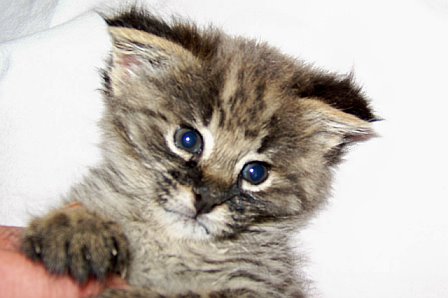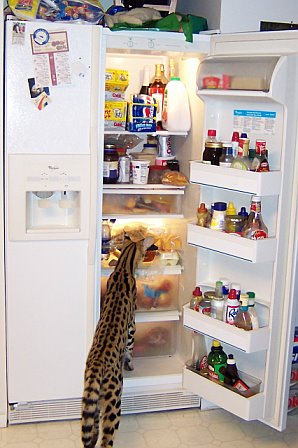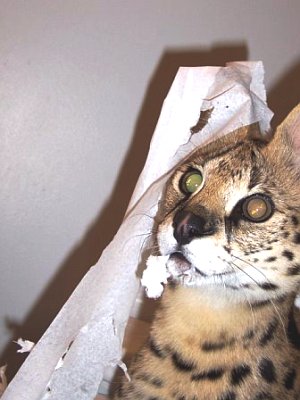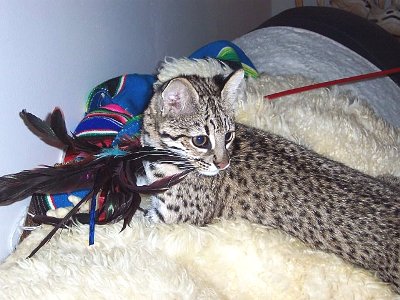
“Pets” is not a
Four-Letter Word!
By Betsy Whitlock
Belle Hollow Farms and Exotics, Franklin, NC, September 2007

Of late I have been troubled by a controversy among the ranks of exotic animal owners. In our attempts to justify our existence and keep our private rights to choose animals of a non-domestic species to share our lives with, some choose to deny the very foundation of private exotic pet ownership in the United States. The fact is a large percentage of captive born offspring of wild feline species are currently held in private homes and small facilities as pets.
Pets for the purposes of this writing are cherished family members of a
non-human species raised with love and human kindness. In order to deflect
the ire of the animal rights groups and those who really could care less
about sharing their lives with animals, some owners point out that they are
motivated by conservation and are concerned for the survival of a given
species. Some of these same private conservationists keep felines who sleep
on the couch and come to names like Sweetie and Sugar. What is wrong with
admitting that?
 |
This justification of private ownership as conservation can be confusing and
misunderstood. This concept threatens to divide the alliance between the
multi-animal owner/breeders from the person who keeps one or two
non-reproductively active exotics. We all have a role to play.
Conservation is accomplished by sustaining a species, either in a wild state
in nature or in captivity, in habitat of human creation. To further
conservation, some breeders consult studbooks and demonstrate serious
concern for genetic viability. It is true that exotic felines are potential
ambassadors for their species if their owners are educated enough to teach.
These felines do contribute to conservation awareness, but captive bred
exotic felines are for the most part, primarily “pets.” We should not let
the forces that oppose our right to keep exotic felines for whatever reason
have the power to define us, divide us, and conquer us.
What is wrong with owning a pet exotic or just being a good exotic pet
owner? From the time we came out of the trees and started to share our fire
with wolves, the companion animal, i.e. pet dog, has been held in high
esteem. Ancient cultures have worshiped the various feline species and
devoted works of art and poetry to them. Felines have been our steadfast
friends and eliminated vermin when we were unable to control infestation
ourselves. These companions comforted us when nothing else could, with a
soft eye, a gentle purr, or just by standing by for us to appreciate the
greater world. Being a companion animal holds a special place in society.
Our exotic pets are at heart no different. For the owner, it is a simple
relationship based upon love of the feline species.
The way I see it, the problem comes when people apply the “exotic” word in
reference to our pets. Somehow it seems that exotics are considered less
trustworthy to be companions, that by their wild heritage they can never
enjoy the same status as a dog. That’s where I think we, as “exotic” owners,
need to attack this problem. We need to point out that captive-bred exotics
are just another branch of the animal family and that in fact they have
been, and will continue to be, pets.
Now, everybody who loves animals probably kept a pet hamster, mouse, or
gerbil as a pet in childhood. They are in fact, “exotics” now made
politically correct under the heading “pocket pets.” Guinea pigs are a food
animal in South America, but the ones you give your children as beginner
pets sure wouldn’t want to hear that. On the matter of beginner pets, many
children start out with the pocket pet previously mentioned or maybe a
parakeet or a goldfish. These are all “exotics” and shows that the general
public does accept that exotics can make good pets. It’s just the rarity of
certain species as pets or the imagined potential for injury that scares the
begeebers out of some people and makes the “exotic pet trade” the target for
fanatics who would have us keep no pets at all.
We as a group must educate the media, the legislators, our neighbors, and
the public to understand that pet exotic felines are not the wild beasties
that feed their imagination or grace Saturday horror movies. Captive born
exotic felines are to the educated and properly prepared owner as much a
companion as your average mutt. In the wrong hands the mutt will bite you
too!
 |
We should continue to advocate responsible ownership of all animals—pets and breeding stock, domestic and exotic. We must stress that every animal is not right for every person, and that every captive-bred exotic feline is not born a killer at heart. No matter what role exotic felines fill—conservation, education, performing animals, or simple pet - there will be no rest until the general public can get past the word “exotic.” It comes down to almost a matter of species bigotry. Even certain dog breeds are facing this prejudice.
Potentially dangerous animals of all species require special care and confinement to protect the general public. Pet horses kill more people than exotics ever have, but no state proposes banning them. Society recognizes the potential for a domestic horse to inflict injury or death and incredibly, in some states’ laws, horse owners can be held completely free of liability by simply posting a sign that states “Equines and equine activities are dangerous.” The same standard should be applied to all exotics.
It doesn’t matter if your pet is a Doberman, wolf, bobcat, savannah hybrid,
or boa constrictor, you should be required to be a responsible owner and
protect your animal and the public by providing appropriate confinement. The
rules should be the same for all, regardless of why the animal is possessed
or what species it is. It’s not the species that is the problem; it is the
owner’s failure to control the individual animal.
The organizations who push to ban our exotic animals really think that all
species of animals are better off left to their own devices, that it is
wrong to be confined to a cage or someone’s home. Well that’s just great if
you were born wild and free, but almost all exotics that share space in
captivity with humans were born in captivity and know no other life. Exotic
felines are usually bred from docile stock that has acclimated to living in
close proximity to us. If being cared for, fed and housed, and not having to
worry about being eaten or starving to death is bad, then I apologize for
oppressing my pets. Those who think that captive-bred animals, whether
domestic or exotic, should move back to the wild world should do so
themselves and try to figure out how to survive on twigs and berries or
re-learn that uncivilized “hunter gatherer” tradition from which our species
sprang.
We all wish to spend a significant part of our lives with our exotic
felines. We should not be divided by each of our individual reasons for
possession, whether it is for pets, valuable genetics, education animals,
performers, or whatever. Each role has its place and its purpose that
supports captive breeding and captive gene pools.
 |
All animals remind us not to take ourselves too seriously. We are not the center of the universe and we are not the only living, breathing, feeling, thing the Almighty put on this planet. We all share this blue marble and the fate of all is vested in each other. We all have a place and a reason to exist. In the case of the lowly pet, no single group has done more to teach people about humanity. To be humane comes directly from people’s experience with not just people, but animals. The interest in and desire for pet exotic felines supports captive conservation breeding of the species. We pet owners should be allowed to continue to associate with our exotic companions and not be marginalized so we can be legislated out of existence.
In my opinion there is no greater status an animal can hold than pet, a
beloved member of my family to be cared for, loved, and cherished, to give
and be given to and mourned for at their passing.
“PETS” is not a dirty word.
Betsy Whitlock is the current Secretary of the
FCF.
She has spent her entire life with animals of one nature or another. She and
her husband operate Belle Hollow Farms and Exotics, a USDA approved
facility, located in Western North Carolina where they breed serval hybrids
(Savannah cats) and are busy acquiring a breeding colony of Geoffroy's Cats.
They currently own 2 servals and 5 Geoffroy's. Her web site is
Belle Hollow Farms & Exotics and she can be reached by e-mail at
Bellehollow@wildblue.net
Images Copyright © Betsy Whitlock & REXANO
www.REXANO.org